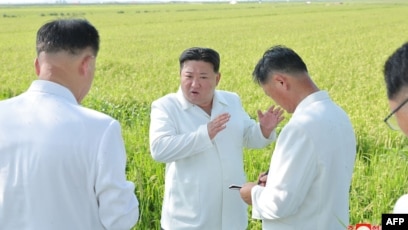North Korean leader Kim Jong Un visited typhoon-hit farms and oversaw military helicopters spraying pesticides in a bid to salvage key crops, state media said Friday.
Tropical Storm Khanun made landfall last week in the North, a country where natural disasters can be devastating due to weak infrastructure and widespread deforestation, which increases vulnerability to flooding.
The visit came hours after North Korea was accused at the UN Security Council of spending heavily on its nuclear arms program while its people go hungry and lack basic necessities.
On Thursday, South Korea's spy agency told lawmakers that around 240 North Koreans had starved to death between January and July this year, member of parliament Yoo Sang-bum told reporters after the briefing.
Kim visited rice paddy fields in Kangwon Province that had been flooded by the typhoon, but predicted a "complete recovery from the damage" thanks to the patriotism of soldiers who helped salvage the crop, the Korean Central News Agency reported.
KCNA images showed Kim, in a white jacket and trousers, squatting at the edge of the paddy field while military helicopters sprayed crops.
The North Korean leader said the rapid response of the military to the typhoon damage had been "performing a miracle of recovering flooded farmland in a brief span of time."
Kim urged the country's entire agricultural sector "to minimize damage by disastrous climate" and ensure North Korea could "attain the goal of grain production for this year without fail."
But some experts questioned how effective the measures would be.
"Kim Jong Un's order to mobilize air force planes is merely a show," An Chan-il, a defector-turned-researcher who runs the World Institute for North Korea Studies, told AFP.
"The appropriate time for pesticide spraying on crops has already passed," he said, adding that reliance on the military for typhoon damage recovery showed other available resources may be depleted.
Food shortages
On Thursday, Seoul's spy agency said people were starving in the North, with the country's economy trapped in a "vicious cycle" with negative growth for three years from 2020-22.
The North's domestic product experienced a significant drop of 12% in 2022 compared to 2016, the agency told lawmakers during a briefing, according to lawmaker Yoo.
The number of North Koreans said to have died due to hunger between January to July was more than double the recent annual average of 110.
The North has periodically been hit by famine, with hundreds of thousands of people dying -- estimates range into the millions -- in the mid-1990s.
The country held a high-level party meeting in February to specifically address food shortages and agricultural problems.
As the storm approached the peninsula, the North had carried out "a dynamic campaign to cope with disastrous abnormal climate" and called for measures to minimize damage to the country's economic output, state media reported.
Earlier this week, Kim berated "irresponsible" officials for failing to prevent damage from the storm.
Pyongyang's recent emphasis on the agricultural sector is "seemingly out of desperation that food issues could become a serious problem," Hong Min of the Korea Institute for National Unification told AFP.
"Kim's choreographed visit and admonishment of senior officials on typhoon preparation" shows the regime is aware that food shortages could impact domestic support, especially as it ramps up confrontation with the United States, Hong said.
Despite its difficult economic situation, Pyongyang has conducted a record-breaking series of weapons tests this year, including its first solid-fuel ballistic missile -- which experts say is a major technological breakthrough.
Washington and Seoul are set to start major annual joint military drills known as Ulchi Freedom Shield next week, a move sure to anger Pyongyang, which views all such exercises as rehearsals for an invasion.
North Korea's leader Kim Jong Un inspects restoration activities at a farm in Anbyon-gun, Kangwon province, which was recently damaged by a typhoon.
North Korean leader Kim Jong Un visited typhoon-hit farms and oversaw military helicopters spraying pesticides in a bid to salvage key crops, state media said Friday.
Tropical Storm Khanun made landfall last week in the North, a country where natural disasters can be devastating because of weak infrastructure and widespread deforestation, which increases vulnerability to flooding.
The visit came hours after North Korea was accused at the U.N. Security Council of spending heavily on its nuclear arms program while its people go hungry and lack necessities.
On Thursday, South Korea's spy agency told lawmakers that about 240 North Koreans had starved to death between January and July of this year, member of parliament Yoo Sang-bum told reporters after the briefing.
Kim visited rice paddy fields in Kangwon Province that had been flooded by the typhoon, but he predicted a "complete recovery from the damage" thanks to the patriotism of soldiers who helped salvage the crop, the Korean Central News Agency reported.
SOURCE:
voanews.com/a/north-korea-s-kim-visits-typhoon-hit-farms-amid-food-shortages-/7230411.html




